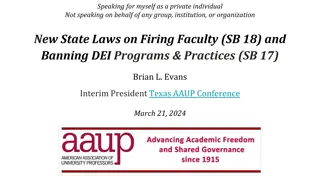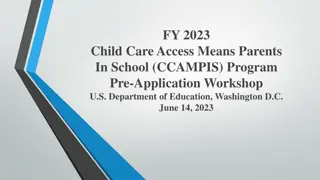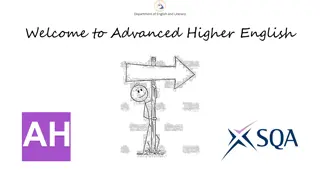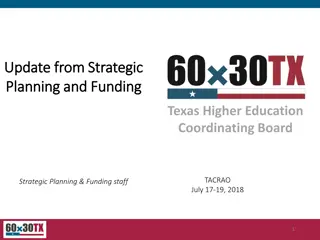Higher Education
This content highlights the powers and duties of the Higher Education Policy Commission of West Virginia, focusing on advocacy, implementing systems, and developing recommendations based on credible data to improve public higher education in the state.
Uploaded on Feb 27, 2025 | 0 Views
Download Presentation

Please find below an Image/Link to download the presentation.
The content on the website is provided AS IS for your information and personal use only. It may not be sold, licensed, or shared on other websites without obtaining consent from the author.If you encounter any issues during the download, it is possible that the publisher has removed the file from their server.
You are allowed to download the files provided on this website for personal or commercial use, subject to the condition that they are used lawfully. All files are the property of their respective owners.
The content on the website is provided AS IS for your information and personal use only. It may not be sold, licensed, or shared on other websites without obtaining consent from the author.
E N D
Presentation Transcript
Higher Education: An Investment in West Virginia s Future HIGHER EDUCATION POLICY COMMISSION NOVEMBER 20, 2015 1
HEPC Powers and Duties -18B-3-3(2-3) oThe primary responsibility of the commission is to work collaboratively with the governing boards to research, develop and propose policy that will achieve the established goals, objectives, and priorities. oThe commission has specific powers and duties, which include, but are not limited to, the following: (A) Advocating for public higher education at the state level; (B) Jointly with the council, implementing the classification and compensation system; (C) Collecting and analyzing data, researching, developing recommendations, and advising the Legislature and the Governor on broad policy initiatives. 2
HEPC Powers and Duties Advocacy (A) Advocating for public higher education at the state level oAdditional costs to employees as proposed by PEIA Finance Board means that most employees will be paying more for medical insurance coverage that they cannot afford to use because of increases in co-pays, deductibles, premiums, and out-of-pocket maximums. oMany of our classified employees already meet federal poverty guidelines for a family with four members. Facing additional healthcare costs would be devastating. oACCE urges the Commission to advocate for all higher education employees by requesting an increase in appropriations from the Legislature that will lessen the burden on state employees, as well as, advocating for the Governor s support on this issue. 3
HEPC Powers and Duties Implementation of System (B) Jointly with the council, implementing the classification and compensation system oHowever, ACCE was very disappointed by another unfilled promise from the Commission when it was reported at the last minute that a simultaneous market study for non-classified employees would not take place. oACCE requests support for the compensation structure to be established once the study is completed, and the process for implementation will move expeditiously with realistic deadlines (while ensuring fiscal responsibility). oSeveral institution s administrations claim they do not have the flexibility to give salary increases. However, if institutions were fully funded as of 2010, and they have a BOG approved salary rule, they have always had the ability to do so if they do it in an equitable manner. 4
HEPC Powers and Duties Developing Recommendations Based on Credible Data (C) Collecting and analyzing data, researching, developing recommendations, and advising the Legislature and the Governor on broad policy initiatives. oReporting is essential if there is to be meaningful accountability oGood data will actually save on personnel costs oHelps with maintaining the system so we aren t having to do all this again 5 years down the road. oActually helps morale in that employees feel they have an equitable system oHowever, excluding WVU and Marshall from the reporting responsibilities has already eroded the good decision-making that would have been possible if ALL employee data were reported through a common interface (Human Resource Information System). 5
The Issue of Additional Flexibility oHow have institutions demonstrated that the flexibility provisions previously granted in state code were insufficient in managing personnel administration? o18B-7-1 (6) Providing for institutional flexibility with meaningful accountability. Without consistent reporting, and reliable data, there can be no accountability. oLegislative intent in both SB330 and SB439 called for a stable, self-regulating human resources system capable of evolving to meet changing needs. oTraining and development, class and compensation positions were added at the Commission level as a result of SB439 to alleviate some of the institutional burdens as it relates to personnel administration. The cost for personnel administration at the institutional level has been greatly increased and more burdensome by virtue of the responsibilities being transferred from the Central Office to the institutional level based on current code. 6
The Issue of Additional Flexibility oWithout implementation of personnel legislation over the last five years, and without implementation of this Commission s own emergency rule on personnel, the case for additional flexibility can not be proven. 7
Required Studies oIn 2005, SB603 called for additional studies to be conducted to determine the advantages and disadvantages to maintain the internal preferences for hiring. oAppropriate definition of a non-classified position and best practice criteria for designating positions as non-classified, as well as, determining the appropriate number or ratio of non-classified positions for the organizations. oReduction in force and furloughs. oIssues related to seniority, including, determining how employees shall be treated who's salaries are derived from funding other than state appropriations. oExtended completion date to January 2018. 8
Training and Development oFill the position SB439 established for Director of Training and Development. oBegin developing training materials and modules: supervisor training, training on evaluations, classification, compensation, PIQs, and even more trainings once the new system is implemented. oCHROs, CFO, BOGs and classified employees will need training on new systems. oMany institutions simply do not have the personnel, training and proper certifications to implement and maintain the new systems. 9
Thank You! The Advisory Council of Classified Employees provides a voice for ALL classified employees in public higher education on matters that affect us. Questions? 10























